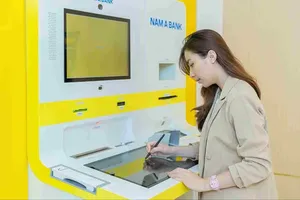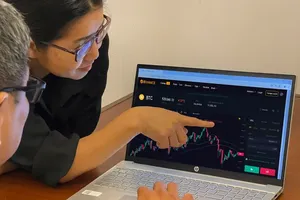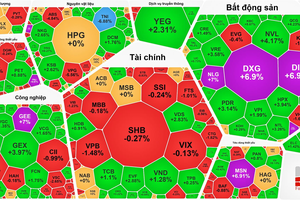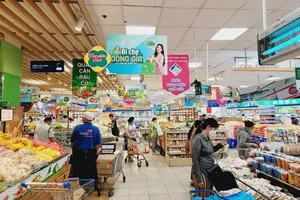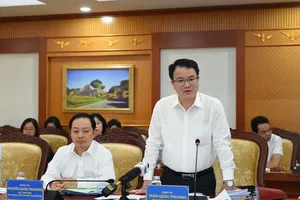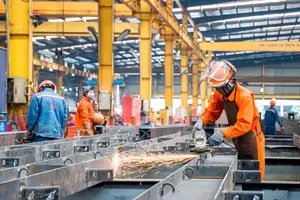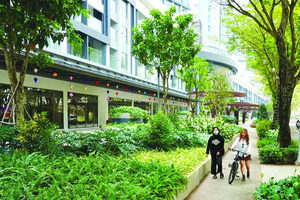 |
At the credit conference on real estate and social housing development |
The bank coordinated with the Ministry of Construction to organize a credit conference on real estate and social housing development in Hanoi yesterday with the participation of representatives of the Government Office, the Ministry of Public Security, the Ministry of Finance, the Ministry of Planning and Investment, the Ministry of Natural Resources and Environment, the Ministry of Justice, real estate associations and businesses.
Reduce real estate credit for consumers and loans for personal use
From the beginning of the year until now, real estate business credit has grown very high. By September 30, the total outstanding credit debt for the real estate sector of credit institutions reached VND2.74 million billion, an increase of 6.04 percent compared to December 31, 2022, accounting for 21.46 percent of the total outstanding debt to the country’s economy. Of which, real estate credit focused on consumption/self-use purposes accounts for 64 percent and outstanding loans for real estate business activities account for 36 percent of outstanding credit loans in the real estate sector.
In the first 9 months of the year, real estate business credit had a very high growth with 21.86 percent, higher than the general credit growth rate and the same period last year. According to the Credit Department of Economic Sectors under the state bank, solutions and efforts of the Government, the banking industry, ministries, agencies and localities in removing difficulties and obstacles for the real estate sector prove effective.
According to a representative of the State Bank, SBV has recently encouraged credit institutions to focus capital on the segments of low-cost commercial housing, social housing, and accomodation for workers as well as control credit risks for the real estate business to promote healthy and sustainable market development. In addition, credit institutions also actively implement loans under the Government and Prime Minister's programs on housing.
 |
Construction workers build a social housing in HCMC |
Moreover, the representative of the SBV's Department of Credit for Economic Sectors, the above data shows that in recent times, the banking sector has made efforts and implemented many solutions following the policies and directions of the Government and the Prime Minister in solving and promoting the healthy and sustainable real estate market’s development. However, with the economy still facing many difficulties, businesses’ trading activities as well as people's incomes are affected, leading to potential risks in real estate credit quality which requires the SBV’s attention.
The real estate credit bad debt ratio as of September was 2.89 percent, an increase compared to December 31, 2022 with 1.72 percent. Credit for consumption and personal use loans decreased, while credit for real estate businesses increased very high. It is noteworthy that the demand for credit to buy real estate has been going down, partly showing that the market's purchasing power is decreasing compared to previous times.
The real estate market still faces many difficulties including long-standing problems such as hiccups in legal procedures related to land, planning, and construction investment and the supply and demand imbalance in segments. Moreover, enterprises in the property sector have poor financial capacity resulting in dependence on external sources of mobilization; plus, housing prices are rising much faster than the financial capacity and income level of many people. Homeownership became out of reach for many would-be buyers.
For the real estate market's healthy and sustainable development, many conference participants said that it is necessary to implement comprehensive solutions with the coordination of many ministries, agencies and localities to tackle legal problems.
In particular, the banking sector will continue to synchronously come up with solutions such as continued review for completion of the legal framework to increase access to credit capital for the economy, ensuring system safety, continued implementation for the policy of restructuring debt repayment terms and maintaining the same debt group to support customers in difficulty as well as monitor closely the implementation of the VND120,000 billion (US$ 4,909,295,725) program, contributing to promoting enterprises’ construction, and people’s purchase of social housing.
The biggest bottleneck is the lack of supply
The implementation of the VND120,000 billion credit program to support social housing has not lived up to the expectation, said Ms. Ha Thu Giang, Head of the Credit Department of Economic Sectors. Two large commercial banks, BIDV and Agribank, have signed a financing credit contract with a total amount of VND1,091 billion for three projects based on their credit commitment and they have disbursed VND105 billion so far. At the same time, the two banks promised to grant credit of VND605 billion to 2 projects.
Ms. Giang also said that the State Bank will closely monitor and closely monitor the implementation of the VND120,000 billion program so that it will coordinate with the Ministry of Construction to have solutions for the acceleration of the program implementation, contributing to the building and purchase of social housing.
Regarding social housing loans according to Decree 100/2015 of the Government, the Bank for Social Policies has only disbursed 55 percent of the plan by September 30 due to the limited supply of social housing in localities. In addition, many people have needs but they are not qualified for social policy credit loans through review. Therefore, the Government issued Resolution No. 181/NQ-CP on November 2, 2023 that the capital plan will supplement loans to create jobs.


